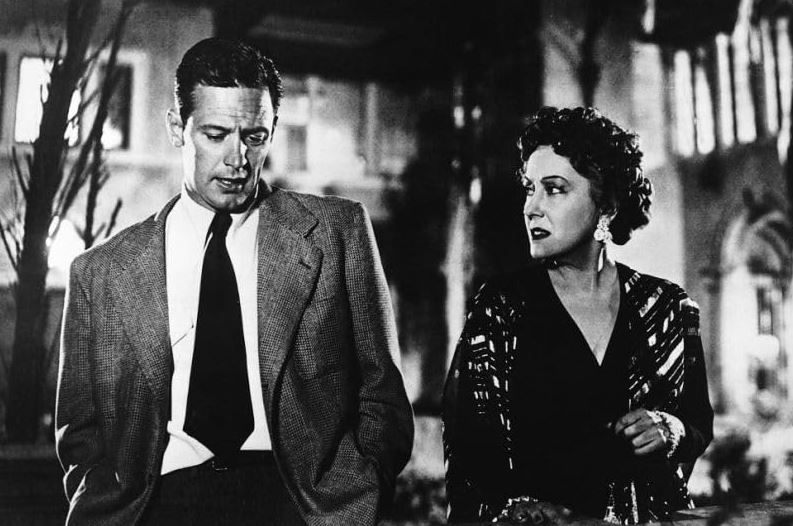
Whom other than the broke, down-on-his-luck writer could tell the story of granduers past and golden eras faded into weed-choked shadows of their former grace. The down-on-his-luck writer is not a purely American character, but should be considered one of the pantheons of American narrators most fit to illuminate our condition, because, in the modern era, we, ironically, are one of few countries rich enough to have down-on-his luck writers. It’s like having a clan of destitute powdered-wig makers roaming the countryside, only first tier societies have the leeway to actually dedicate a portion of their workforce to…putting words in order so’s they sound pretty. You know what a down-on-his-luck writer was called in 18th century Croatia?—nothing, he was a fucking blacksmith.
But there is a whole dusty clutch of broke writers in American society, like that other wandering, desperate, American ne’er-do-well: the Hobo. Hopping from train car to train car and eating sardines out of a can is very much the existence of the down-on-his-luck writer, if you replace the train cars with friend’s couches and the sardines with ramen cooked over a hot plate precariously placed on a stack of old Maxim magazines. And since the woes of this breed, unique to itself, are told by themselves, you must disregard certain tropes they can’t help but insert, like getting laid, or enjoying family functions, or wearing clean clothing. Writers don’t get laid, they hate to go home and explain themselves and while it’s possible to wear your clothes inside-out in the shower and scrub yourself like normal, that doesn’t fool most people that you aren’t in the grip of scabrous poverty.
What really tells a writer he should change professions is when they come for his car. Down-on-his-luck writers develop a rabbit’s spatial awareness, because foxes who have actual, gainful employment predate them relentlessly, pitiless as to the noble, artistic sacrifice these young men endure …until they aren’t young anymore and then it’s just sad. Either way you’re taking the bus.
Most down-on-his-luck writers consider their eventual death with a wry smirk, being writers, who can only think in narrative beats, they still want the story of their exit, at least, to be a gasser—posthumous success ain’t ideal, but it looks a lot prettier than when you catch yourself in the mirror and see a man with half a beard because his last razor broke mid-cheek.
So, the writer in Sunset Blvd, is dead, floating face-down in a swimming pool, a .38 caliber bay-window in his back, adjacent to a house he could never afford, in a suit he could never afford, sporting a watch, cigarette case and haircut way out of his budget. Sounds tragic, I know, but you’re not a writer. . Writers know it’s a bitchin’ way to start a movie.
And sometimes they get to narrate.
“This is Sunset Blvd., Los Angeles, California, it’s about 5 in the morning” William Holden says as a line of squad cars blare sirens on their way to…wherever “…that’s the homicide squad, complete with detectives and newspapermen. A murder has been reported in one of those great big houses in the 10,000 block. You’ll read about it in the late editions, I’m sure. You’ll get it over radio and television, because an old-time star is involved. One of the biggest. But before it gets distorted and blown out of proportion, maybe you’d like to hear the facts. The whole truth.”
The line of squad cars stops in front of the grand entrance-way of a large house, then a platoon of photographers with flash-pans like silver satellite dishes divert to the side of the house where there’s a pool. “The body of a young man was floating in the pool of her mansion, two shots in his back and one in his stomach. Nobody important. A movie writer with a couple of B pictures to his credit. The poor dope. He always wanted a pool.”
We wiggle into flashback, “I was living in a studio apartment, things were tough at the time, I hadn’t worked for a while”–here’s a tip, when an actor says he says he hasn’t worked in a while, he literally hasn’t worked, when a writer tells you he hasn’t worked in a long time he means he hasn’t gotten paid for working—being a writer is like an ironic curse from a bitter gypsy woman, oh you’ll always work, you’ll work all hours, it’s the getting paid to work that never happens, if you don’t have over a million unpaid words stored in your closet next to your golf shoes, you’re not a writer, I hate to play gatekeeper but there’s a line that separates ‘inebriated wastrel’ from ‘writer’, and that’s it. Standards, people. It’s what keeps artsy, pretentious lazy drunks from being unfairly classified with common, ordinary lazy drunks.

You can also get my contact details and read samples of my work on LinkedIn…if…that’s…of interest…or anything.
“So, I sat there grinding out original stories, two a week, but I seemed to have lost my touch–” What he means by ‘lost his touch’ is that he’s finally become dis-enamored with his own genius, the blinding pixie-glamor that made him kick that gypsy woman in the first place, “Maybe they were too original,”– that meant he still had some pixie-glamor left, “What I knew was, they didn’t sell.” and there’s that gypsy, hiding, watching from behind a taco cart, her nose-mole a-glistenin’. (Rule #1)
Right on cue there’s a knock at his door. It’s a funny thing, once you acquire the spatial awareness of a prey animal you can actually tell who’s on the other side of a door just by their knock, from the resonance of the wood and the tell-tale density of the knuckles doing the knocking, you can discern, with very little practice, if it’s a cop, the landlord, a Mormon or a collector—because it ain’t like it’s a girl or anything. For our narrator, it was a collector.
They wanted his car, he gave them the stall, you can’t have what ain’t here—because a good rabbit knows to park his car a block away behind a dumpster. They leave, but hasenpfeffer was certainly on the menu.
Rules for Rabbits # 2: Don’t be ashamed to exploit people who like you.
Our writer friend had a guy at a studio he thought, maybe, with a little song and dance, could throw a paycheck his way. The fondness people have for you quickly becomes a commodity in the wilds, but all rabbits learn that fondness is thimble deep and a half-dollar wide. He pitches his story, a baseball B-picture that’s been done a dozen ways and when his executive friend calls in the script-reader, she says as much—not knowing he was the writer.
She’s a lot like him. A little younger, not yet as sour on the experience of Hollywood as he, so from some angles, maybe she was likeable, but goddammit did she have to tell the truth! There’s a ‘46 Plymouth he has to cover in branches and shrubs just to take a leak at a gas station.
Betty Shaeffer happens to be the fiancé of his friend, still, given she just doused his dreams of short-term liquidity in crude oil and struck a flint, he’s a bit rude. She feels bad, not bad enough for him, but bad. But there’s kinship that develops, they both have dreams of a Hollywood-something, she’s petty and wanted to be an actress but now, as her twenties grind on, she figures it’s behind the camera where she belongs. In fact, she wants to be a writer. Did she kick a gypsy too?
Rabbits have secret places where they can grab a turnip-stub and get a fox-report from the other rabbits, Joe Gillis had a drug store with a pay phone, from here he tried to get a call in to his agent—it’s a great job being an agent, you don’t write anything, you don’t sell anything, but when one of your clients does write something that’s salable, you get 10 percent: it’s sweet gig for evil men who hate bunnies and love golf. That’s where Joe found his agent, on the golf course.
The rage and desperation comes off of William Holden like a stink. He needs work, and the well-fed platitudes coming off of his agent make it worse, “I’m not just your agent, I’m your friend, this is the best thing that could happen to you, now you’ll have to write.”
“What do you think I’ve been doing!”
“Baby. Maybe what you need is another agent.”
And a bath. But there’s no talking to those people, what to do, how about a long drive to assemble his options, maybe down Sunset, its beach vistas will clear his head a give him– OH, BA-JEEBUS! The collectors were right there at the red light, he sees them, they see him, their eyes squint and Joe Gillis pounds the accelerator.

Figgilty-piggilty giggilty-foe/ I curse you with a lofty goal/ day and night you write and write/ but no one reads or pays or likes/ because my pronouns are not a joke
Real life car chases aren’t exciting. Unless you have a siren and a badge, all you can do is go on a faster than a normal joyride and try to find a place to ditch, but before he could say ‘Eighty in a Forty-five’ there was a driveway.
It was deeply hedged and he just managed the five seconds to tuck inside before the collectors made the corner and spotted him, but he got a second dose of luck, there was a four-bay empty garage at the end. An old, abandoned mansion, overgrown with weeds and clinical depression, lay beyond. See, kids—in America, just when you’re at your lowest, St. Rabbit swoops down dressed as Monty Hall and tells you to pick a door, make sure to leave a carrot and a shot of rye on your doorstep next time this happens, shows him you’re one of the faithful.
There was an old car in the garage, on blocks and covered, a museum piece, the model Archduke Ferdinand was shot in, so there must be people. As he perused the estate, walking past the empty pool, a woman’s voice jolted him out of his sock garters, “You there, why are you so late?” A German butler (Eric von Stroheim) met Joe Gillis at the palatial front door. Being mistaken for something else, he was shown upstairs—though trying to explain himself he was rough-rolled into the master bedroom where he was met by…a dead monkey.
Well, a chimp.
Then the creepy middle-aged lady, who must have been beautiful in her day, began to lay out her plans for the chimp’s coffin. Joe examines her face, “Say, haven’t I seen you before? You’re Norma Desmond, you used to be big.”
The medusa rushes into her eyes, “I am big! It’s the pictures that got small!”
Gersh! Alright, then, the broke writer knows when to leave, good day Madam, swell place this must have been before the, uh, you know, ‘peasant revolt’, I guess— you better get that monkey in the ground before he goes ripe.
“Say, there,” she calls down to him as he retreats “Did you say you were a writer?”
Rules For Rabbits #3: Say Yes to Everything.
Seems Miss Desmond lives there all alone with her butler and her monkey (‘Chimp’! Whatever!) and her faded memories of the twenties when all male humanity wanted to get up in her moldy snizz. Norma Desmond’s story of faded fame and wilting beauty echoes that of the actress who plays her, Gloria Swanson, both greats of the Silent Era tossed aside for talkies, except Norma kept her money, Gloria had, shall we say, more trouble, still it was the part she was, not ‘born’ perhaps, but ‘reluctantly-aged’ to play.
This old bat had a screenplay (sheesh!), a 700 page screenplay, (jee-zus!) , a 700-page handwritten, like, on-paper-with-a-pen handwritten screenplay (please come, black-hole-sun…wash away the rain, please.) and she wanted him to ‘look it over’. The look on William Holden’s face as he saw the stacks of scribbled scrap tells you what every writer would think—that. is a steaming. pile. of shit. But how could he know without reading it? If you asked that you aren’t a writer, because writing is about the details and if you can’t type it means you were never serious about the other minutiae of the writing craft like scene structure and tonal point of view and the other things that make fiction smooth and readable. Believable dialog? Nah, how ‘bout a long meandering speech that replicates what you saw last night on PBS—brilliant! * scribble* scribble *

“It’s a… coffee table book.”
Rules for Rabbits #4 Paint Every Stupid Idea in a Positive Light, in other words, give hope where they, realistically, should have none.
A rich dope out of his depth has been the savior of many a rabbit, and Joe Gillis knew this rich dope was his way back into traffic. Sure, he’d take the job—Wait! What are all my clothes and the contents of my closets doing here [looks at watch] five minutes later. Madam, apparently, wishes him to stay on the property. Klaus von Tuxedo cleared out his apartment by himself? Yes, and paid off his back rent.
Well, now. Isn’t that creepily, disturbingly, claustrophobic-ally convenient.
WANTED: Writer with credits. Handsome, young, for extended service as a pet to replace the monkey. Must enjoy placating a vain woman’s fantasies of relevance and lighting cigarettes.
This crazy bitch had a 700-page script about ‘Salome’, you remember, the TEENAGE step-daughter of Herod who asked for John the Baptist’s head on a literal silver platter when, as reward for her sexy dance (what a simp that guy was) offered her ‘Anything, even to half of my kingdom.’ So, spurred on by her mother, she demanded John’s pumpkin. John the Baptist was most critical of Herod’s marriage to his sister, which kind of endeared Herod to him—brave man, speaking reckless, balls of bronze—but threatened her so much she finagled his arrest and murder, by having her cooze daughter jiggle her tits for her uncle/step-father. Odd household dynamic. And HALF of his kingdom? The best tip a stripper ever got, makes that roll of bus tokens you slipped Champale down at the Wiggle Hut seem insincere.
And Miss Can’t-Take-a-Hint wrote a 700-page movie about it wherein she, get this, would play the titular ‘Salome’–the teenage tit-jiggler, her, the woman whose pet monkey just died of old age. (Yes! chimp! fine!)
He didn’t argue with her, but he realized quickly he wasn’t there to write, she wouldn’t let him touch a word: [scratching an ‘X’ through a page and letting it drop]
“What was that?”
“Just a scene that I cut.”
“What scene?”
“You at the slave market, better to cut right to John the Baptist–”
“Cut away from me?”
“There’s a little too much of you, they don’t want you in every scene.”
“Then why do they send me fan letters every day?! Beg for my photograph?! Because they want to see me! Me! ME! Norma Desmond. Now put it back.”
Whatever, Sugarplum—I’m just kicking cans so I can pad the bill and blow this nuthouse.
Every production still and 8×10 ever taken festooned the walls and every open surface. She wasn’t alone, he narrated, she was living with a thousand Norma Desmonds. She even had movie nights where the choices ranged from ‘Her Movies’ to ‘More of Her Movies’. “It’s nicer than going out,” she told him. But he was wise to her, she didn’t want to go out because going out there would make her confront the fact that time passed, that her era faded.
Max ran the projector and she creamed herself over her own image, “We didn’t need dialog, we had faces. There’s no faces like that anymore.” But her self-lust would turn angry “Those idiot producers, those imbeciles, haven’t they got any eyes, have they forgotten what a star looks like?! I’ll show them! I’ll be up there again, so help me!” She was standing in the projector’s beam, thrusting her hand in the air—50 pounds of crazy in a 10-pound bag.
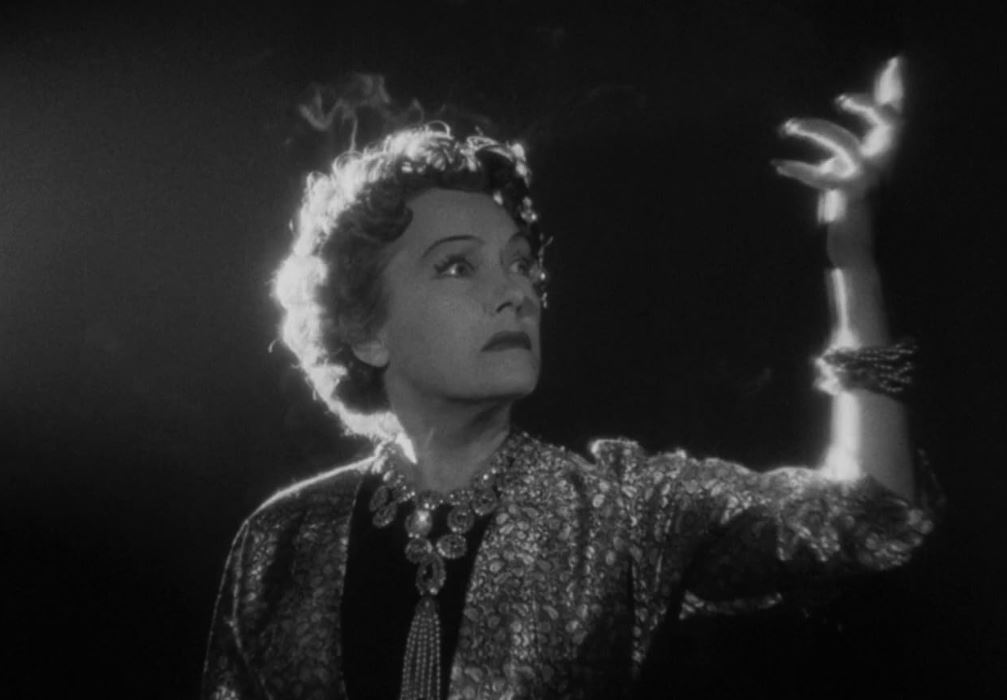
“Seventeen minutes of trailers?! How can I possibly wait that long to see Herbie: Back in Action?!”
To her justice, the movie they were watching was Queen Kelly, starring a very young and marvelously fetching Gloria Swanson. Queen Kelly was never released in the United States which is why Billy Wilder chose it, because audiences would take it as fiction—strangely, it was directed by none other than Eric von Stroheim, (Max the Butler) and was the source of their falling out thirty years before because, well, the German, Herr von Stroheim, didn’t have the modest sensibilities of the American actress, basically he wanted her to show a portion of her milkers, everything but the nips. But since they both jumped at the chance to do this picture with each other, I’d say bygones were underboob—uh, ‘bygone’.
Norma Desmond wasn’t a complete shut-in. She had friends. One card-night contained real silent movie stars in cameo: Anna Q. Nilsson—this woman was once named the ‘most beautiful American girl’ in 1907, then ‘the most beautiful woman in the world’ in 1914, and then Photoplay magazine dubbed her the ‘ideal’ American girl in 1919, of course, because everything was silent, nobody knew she was from Sweden. H.B. Warner was at the table, too, he was famous for playing Jesus in Cecil B. DeMille’s King of Kings, but the role you know him for is as Mr. Gower, the pharmacist in It’s a Wonderful Life that slaps the dead ear off of young George Bailey in one of that movie’s several tear-inducing moments.
Frank Capra cast him a lot, resentful that an actor he so admired was tossed away because sound came into the mix. And then there was the one everybody remembered: Buster. Mr. Buster Keaton. There was no one bigger than him. Not Harold Lloyd, or Charlie Chaplin or his buddy, Fatty Arbuckle, and he’s the only one at that table that is not only remembered to this day but imitated the world over (Jackie Chan called him his ‘cinematic ancestor’, as in everything I am and everything I do is to your credit, for a Chinaman it’s a HUGE thing to say, and coming from that Chinaman it’s even bigger).
Audiences in 1950 literally wept with joy when he uttered his one line in Sunset Blvd. at the card game “Pass,” he said “pass.” Why did they weep? Because it was the first time he’d ever spoken on camera. And his voice sounded just like it should, a kind of middle-American decent male voice—of course, that’s what he sounds like! He could sound like nothing else! There were tears, man. Literal tears.
He was also a renowned bridge master, so Billy Wilder had everyone mimic him.
Cue the tap on Joe’s shoulder, Max had bad news, those collectors—who should have been looking for the Lindbergh baby, since apparently, they can find anything—discovered his car. He needed money fast. So, he asked Norma. Piff-piff, was her general reaction. As he stands outside watching it get towed, recalling that he left his balls in the back seat, she strolls up and asks the problem. He tells her.
She said—and pay attention to her language in the next sequence:
“We don’t need two cars; we have a car. Not one of those cheap new things made of chromium and spit. An Issotta-Fraschini.” So, the old Archduke Ferdinand gets taken off blocks, 5 tons and upholstered in leopard skin, the butler takes them for drives (Eric von Stroheim did not know how to drive, so the car was towed but he managed to steer the thing into the Paramount guard’s booth.
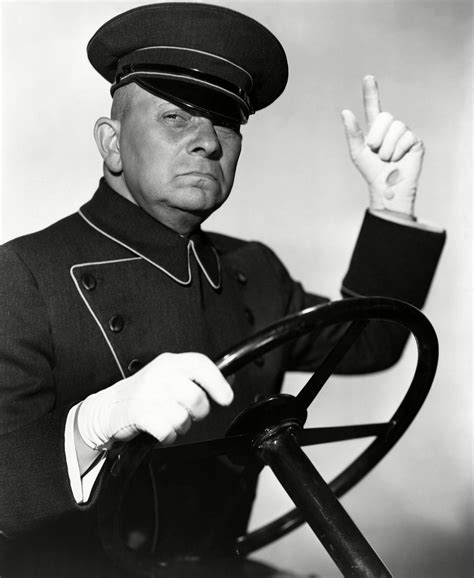
No driver’s license but can operate a Zeppelin.
Can’t cook but can make poison from tears
Can’t swim but can hold his breath for eleven minutes
Ladies and Gentlemen, I give you: the German, frighteningly capable in the most disturbing of ways
“That’s a dreadful shirt you’re wearing.”
“What’s wrong with it?”
“Nothing if you work in a filling station. And I’m getting bored with that sport jacket and the same baggy pants.”
–Bitch, I’ll have you know I stood in a cold shower and laundered this suit with Irish Spring and Prell for Men—Twice! —
But she tells the butler to take them downtown, this upsets Joe, to which she replies “Why begrudge me a little fun? I just want you to look nice…and must you chew gum?”
Uh-oh.
At the men’s shop Joe tries to put his foot down, “I don’t need a tuxedo.”
“Of course you do, you need one for parties, for New Year’s Eve.”
He tries to protest but she walks away with a salesman, then another strolls up, “This one’s vicuna, it’s a little more expensive than the camel’s hair–”
“The camel’s hair will do,” he says.
“Forgive me for saying so sir but, so long as the lady’s paying, why not go for the vicuna?”
Then the salesman opens up a stamp pad and Fump! stamps ‘WHORE’ right on his forehead.
Back at the house, Joe’s transition from wild rabbit to kept-man is completed when the butler moves him into the main house, nee, the other master bedroom which was occupied by * gulp * her three husbands. Here he first notices that there are no locks on the door, to which the butler informs him that no door in the house has locks because, “Madam has fits of melancholy, you understand.”
There are no pills, the gas is shut off and razor blades are dispensed on a need-to-use basis and taken back, like bowling shoes.
“Why? Her career? She still gets all those fan letters.”
“I ask you not to look at the postmarks on those letters.”
“It’s you. You send them.”
“I must press your evening clothes now, sir. Tonight is Madam’s New Year’s Eve party.”
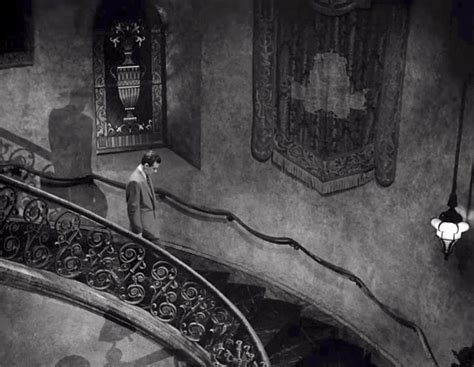
Lousy good-for-nuthin’-tellin’me—I’M A MAN DAMMIT!—tellin’ me ‘bout how I dress—I AIN’T NO LITTLE BABY NO MORE!–tellin’ me to go get your eye cucumbers—make you look like an owl—I’ll get your stupid eye cucumbers—BUT I WON’T WEAR AN ASCOT!– I ain’t David Niven–David Niven is English and he’s stupid and you’re stupid–
The word ‘party’ took on a whole new definition in that house, there was a string ensemble, merrily playing, Max the butler was pouring champagne, but other than these, no one, and no one was coming. They danced, well, she danced, he numb-footed his way around with her, “What a fun year we’ll have. I’ll fill the pool for you, or I’ll open my house Malibu and you can have the whole ocean. Once our picture’s done, I’ll buy you a boat and we’ll sail to Hawaii.”
“You’ve bought me enough.”
“Who cares, I’m rich. I have a million dollars.”
“Keep it.”
“Three blocks downtown, oil in Bakersfield, pumping, pumping, pumping.”
That’s it! Joe had had enough. He bolts up, “Has it ever occurred to you that I have a life of my own. That there maybe there’s a girl I’m crazy about.”
The medusa comes back into her eyes, “Who? Some carhop or dress extra?”
“What I’m trying to say is I’m all wrong for you.”
“What you’re trying to say is that you don’t want me to love you. Then say it. SAY IT!” He goes silent and she smacks him crisp. Then she runs upstairs, more like belly-flops up the staircase (think Joe Biden) fleeing the scene of her rejection like it was a rabid wildcat, in a wonderful touch, Billy Wilder films her bursting through a door and it swings shut then he zooms in on the missing lock.
It’s been a long time coming, Joe gets his coat, and car-less, begins walking. He walks all the way into town to his buddy Artie Green’s place and the party—a real party—he knew would be there. Everyone’s agog at his fancy duds, despite this he asks to use Artie’s couch for a couple weeks (all ABOARD!–Sardine?). Everyone stinks of poverty, for entertainment there’s an upright piano and for potables a thin punch kicked with the last ounce of eleven different bottles of booze and probably some Sudafed. But the relief in Joe’s face, you could feel the life there in comparison to that dowdy, overgrown monkey cemetery (I know it’s a chimp! I’m saying monkey, it’s a literary choice, leave me alone, ya’ pedantic sons-a’–).
Monkey.
And guess who else is there, why it’s Betty Schaeffer, Artie’s finance, the truth-tellin’ career killin’ former actress and, probably, puncher of kittens. They end up burying the hatchet over a cup of that dodgy grog—it’s New Year’s, let old acquaintances be forgot and so forth and so on. And on that note, time to officially end his tenure back on Sunset: he calls Max the butler, tells him to get his stuff together, he’s leaving, but Max is curiously short with him “I have no time to do anything now. The doctor is here, madam has taken a razor from your room and cut her wrists.”
Oh, fuck me.
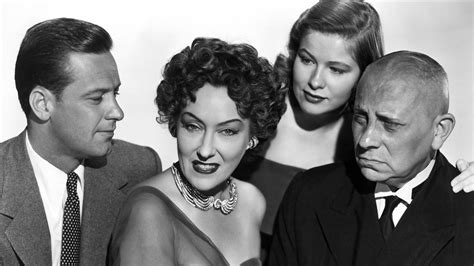
“He who smelt it, dah-ling.”
So, he gets his vicuna coat and bolts back by cab. There she lay, both wrists bound, “Go! Go back to that girl you love and leave me alone.” He refuses until she acts like a sensible human being “I’ll do it again! I swear I’ll do it again!” This was actually a haunting scene of Gloria Swanson’s, I believed her, in all her dark, decrepit self-pity pancaked with melodrama—not the film’s melodrama, mind you, the character’s melodrama, Swanson chose the delivery perfectly.
He admits there was no girl, that he just wanted to pull stakes, she admits her pride, he tells her she helped him out of a spot and he wanted to let her down easy, then the New year rings in and they kiss, fade to black. I suppose this implied he had sex with her, but that’s even more disturbing: imagine plowing some lady’s back forty and she has to balance on her elbows because she just severed the arteries in both wrists over your leaving. Am I taking crazy pills? how is that sexy? I just attempted to corpse myself with your razor so, now, just rub the tip on it a few times. It’s a fucked-up existence we have.
I talk a righteous game but I’ve done it, too. It’s not like I’d be proud of it (black hole sun… black hole sun…)
Time passes and Joe Gillis has resigned himself to pet-rabbit status: he’s learned to play bridge, dance the tango, Norma however has recovered beautifully, she’s even acquired a better, more realistic opinion of herself, she says it’s because he made her so happy. Then a chance meeting changes the trajectory, in the drug store—that drug store, the rabbit drug store—Joe goes in to buy some cigarettes for Norma waiting in the car, and he runs into Artie Green and his girl Betty. Turns out Betty been trying to reach him, she felt so bad about harpooning his baseball picture she dug up one of his other ones and sold it to his producer friend, but not all of it, most of it would have to go, Betty says she wants to re-write it, but with Joe. He’s retired, he says. But Joe can’t get it out of his head.
Later, as he lay miserable on Norma’s couch, while she does some half-ass church talent show, he narrates, Betty. She’s like all of us when we first hit Hollywood, itching with ambition, so eager to see her name up there ‘Screenplay by’, ‘Original story by’. People don’t know that somebody actually sits down and writes a picture, they think the actors make it up as they go along.
A few days later they went to Paramount to talk about their screenplay, and here we witness the kind of star Norma used to be:
Norma: Open the gate.
Jones: Right away, Miss Desmond.
Guard: [to Jones] They can’t come on the lot without a pass.
Jones: Miss Desmond can.
Norma: Thanks, Jonesy. And teach your friend some manners; if it wasn’t for me, I wouldn’t have a job, there’d be no Paramount Pictures all together.
..and she’s right, well, Gloria Swanson is right, it was largely her who kept that studio afloat. The open kimono in this movie is occasionally staggering.
Like this:
In probably the first ever actual behind the scenes footage, Cecil B. DeMille (Cecil B. DeMille, yes, really) is on a sound-stage shooting a movie. The actual movie he was then shooting. On the actual sound-stage, with the actual crew, and the actual actors. It was Samson and Delilah, one of his biggest hits. But Cecil B. DeMille (I remind you, it’s actually him) basically lays out the tragedy of Norma Desmond as he waits for her to arrive, to talk about ‘that awful script of hers’.
Asst. Director: I’ll give her the brush off.
DeMille: 30 million fans have already given her the brush-off. You didn’t know her when she was seventeen: with all the courage and wit and heart that ever came together in one youngster.
A.D.: I heard she was a terror to work with.
DeMille: Only toward the end. A dozen press agents working overtime can do terrible things to the human spirit.
…and the saddest thing happens. Norma strolls in greeted by C.B. DeMille and he sits her in his chair, then from the rafters someone calls out, “Miss Desmond, it’s me Hog-eye!”
“Hello, Hog-eye.”
“Let’s get a good look at you,” and the man pans a huge spotlight over, illuminating Norma. That’s when everybody on the set notices who’s there, they rush to her, a throng “Miss Desmond remember me?” “Welcome home, Miss Desmond.” “Have you met Harry Wilcoxon, the star of the picture.” “It’s a great honor.” “It’s so wonderful to see you, Miss Desmond.” “This place hasn’t been the same, Miss Desmond.” A gaggle of giddy fans, DeMille let it go on, he didn’t want to end it because he knew this, this brief moment, was her last echo of what she’d been, but eventually he picks up the P.A mic “Hog-eye,” he says reluctantly “Put that spotlight back where it belongs.”
He wasn’t telling a workman to set his light alright, he was officially ending Norma Desmond, and you can feel it. The crowd disperses as soon as the light drifts away. “Did you see them, how they came?” she said to DeMille, and just as he starts up his we could-but we can’t-but we might-but we won’t studio brush-off, she begins crying. He doesn’t want to do the deed, he’s grit-jawed, like he’s about to shoot a wounded deer.
Norma spills out of the stage, being patted on the hand by DeMille, followed by a throng of fans “We’ll see what we can do, Norma.”
“I’m not worried, everything will be fine, the old team is back together again. Nothing can stop us.”
“The old team, yeah.”
Chik-chik…snap!. Dry fire. He couldn’t tell her the truth.
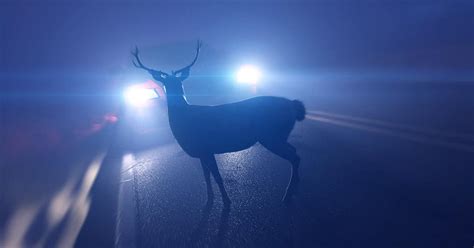
I think that bright, growling, quickly-approaching animal wants to be friends, derp!
Joe narrates: After that an army of beauty experts invaded her house. She went through a merciless series of treatments, like an athlete, she counted every calorie and went to bed at nine. She was determined to be ready for those cameras that would never roll.
But Norma knows something, Joe sneaks out at night, takes the car, but to where? To Betty Schaeffer’s apartment so he can work on that script, that’s where. Writers are like smack addicts; they’ll chase that dragon through poverty and persecution and Perdition’s flames before they give it up. Pity these people. Really.
And wouldn’t you know it, on their ambles through the back lot, more than just a professional interest develops.
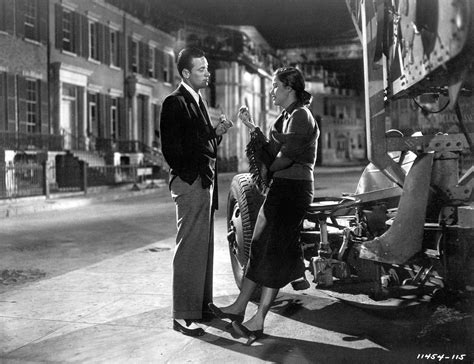
Yeah, they faked the A-bomb footage right here, the real thing was just Diet Coke and Mentos
Maybe he feels a little guilty when he gets back to Sunset Blvd and Max is waiting there, was he spying?
“It is not my business where Mr. Gillis goes at night, but I’m worried about Madam.”
“How? By feeding her lies? What happens when she finds out there will be no picture?”
“She never will, that’s my job. I discovered her at 16, I made her a star, I cannot let her be destroyed.”
“You made her a star?”
“I directed her first pictures. Back then there were three directors of promise: Griffith, DeMille and Max von Myerling.”
“And she made you a servant.”
“It was I who wanted to return, I found things unendurable when she left me. You see, I was her first husband.”
Ewwwwwwwww! –Now that I think about it, you’ve been a real gent considering I’m plowing the woman you love! Cordial even. Maybe too cordial? You been watchin’ us through the lock-holes, ya’ pervert?!
Norma’s suspicious that it’s a woman, she finds a piece of paper in Joe’s pocket with Betty’s name on it. For Betty’s part their nights together take her from Artie, Joe’s friend. She looks at him longingly, she says that Artie wants to get married in Arizona where he’s working, but Betty confesses she doesn’t love Artie any more (Author’s Note: fickle twat, it’s been like 20 days) she loves Joe.
Joe loves her too, or does he, what about Artie, he can’t betray him? Was it betrayal? The girl doesn’t love him anymore, should he spin her around and march her back to Artie, if she doesn’t love the guy, she doesn’t love the guy.
He gets home and hears somebody dialing the phone, then he hears Norma asking for Betty, apparently, she’s called several times, Betty takes the phone from her roommate, annoyed. “Who is this?”
“Do you know Joe Gillis? Do you know where he lives? Do you know how he lives? What he lives on?”
“What business of it is yours?”
“I’m trying to save you a great deal of misery.” Then implies he’s a girl-hustler and tells her to ask him where he lives.
Joe snatches the phone, “That’s right Betty, ask, or better yet come out and see for yourself,” and he gives her the address.
Swanson gets the melodrama of the character perfectly again, “Don’t hate me Joe. I did it because I need you. Look at my hands, under my eyes, how can I go back to work if I’m wasting away under this torment. You don’t know what I’ve been through these last few weeks. –I bought myself a revolver, I did. I stood in front of that mirror but I couldn’t do it. Don’t just stand there hating me! Shout at me! Strike me! But don’t hate me!”
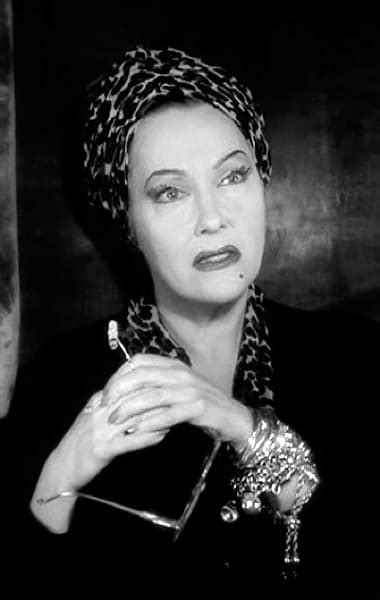
I also killed your goldfish, called in a bomb threat to your class reunion, exchanged your toothpaste with frog semen and put a powerful defoliant in your shampoo—but who are you to judge me?!
Not long later the front bell gongs, it’s Betty, come to fetch him. In what I can only believe is an attempt to scare her, letting her decide for him, Joe tries to come off like a greasy gigolo, after bragging about the opulence, and telling her about his suits and cigarette cases and how going with her isn’t practical “I’ve got a good deal here, a long-term contract with no options. Maybe it isn’t admirable, but you and Artie can be admirable.”
“I can’t look at you anymore, Joe.”
“ How about looking for the exit? Good luck, Betty, maybe you can finish that script on the way to Arizona.”
Joe is disgusted with himself. He walks upstairs, Norma tries to say it’ll all be like it was, but Joe’s already packing, he’s going back to Dayton.
“You think I made it up about the gun?” she disappears and reappears with a pistol, “I’m not afraid to die, you may not care but they will.”
“You’ll be shooting yourself to an empty house.”
“Hundreds of thousands of people will care.”
“Wake up Norma, the audience left 20 years ago.”
“That’s a lie! They still want me!
“No, they don’t.”
“What about the studio, what about DeMille?”
“DeMille didn’t have the heart to tell you, none of us did.” Chik-Chik…Boom! And there goes Bambi’s mother.
“That’s a lie, they still want me! I get letters every day.” Just then Max arrives at the door.
Joe says “Tell her, Max. Do her that favor. That there’s no letters but the ones you write.”
Max is furious, but contains his Teutonic rage in a Westphalian mask of duty, “Madam is the greatest star in the world. I will take Mr. Gillis’ luggage to the car.”
The amazing thing is by time Max retrieves the bags and walks away, Norma’s gone full-on batshit—Twig goes snap! Just like that. She all of a sudden got them crayzee eyes.
“You heard him,” she hissed “I’m a star.” Those crazy eyes just’a googlin’.
“You’re a woman of fifty, there’s nothing tragic about being 50 unless you try to be 25.”
“The greatest star…in the world.”
Why are you looking up, is there a pigeon up there or something?
Joe Gillis walks out, he’s done. But maybe if he’d have stayed a few seconds he would have heard, “Nobody leaves a star. That’s what makes them a star.” She rushes after…
Holy Buh-Joley Bambi’s mother has got a gun!
Rules for Rabbits #5: Never turn you back on a crazy bitch with a pistol.
As Joe walks out the front door, as he’s passing the pool, on his way to the garage, Bam! in the back, he turns Bam! in the belly, he spins Bam! another to the back Splash! into the pool he goes.
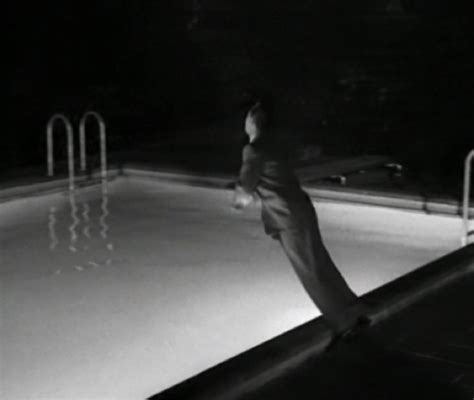
Just then I realized I had 8 grand in my savings account the whole time.
He narrates: Well, this is about where you came in, back at that pool, the one I always wanted. It’s dawn now and they’ve photographed me […]then they got some pruning hooks and fished me out. They beached me like a harpooned whale. By that time the place was jumping, cops reporters, neighbors[…] the newsreel guys came by, this was something everybody could have fun with […] What would they do to Norma? Even if she was acquitted: crime of passion, temporary insanity—those headlines would still kill her. “Forgotten star a slayer” “Aging actress”.
Here’s a magnificent cameo, Hetta Hopper, gossip queen of Hollywood for thirty years makes an appearance, in the parlor, phoning in the story.
Upstairs the police are grilling Norma, who’s too dazed in her own nuttiness to answer a question. Then somebody tells the cops about the newsreel cameras and she perks up, “Cameras?”
Max plays along, “The cameras have arrived.”
“They have? Tell Mr. DeMille I’ll be on the set at once.”
The cops shrug, if it’ll get her downstairs.
Max said “Everything will be ready Madam.”
“Thank you, Max., You’ll pardon me gentlemen, but I must get ready for my scene.”
Max takes the director’s role in front of the newsreel cameras, “Lights!–Are you ready Norma?”
“What’s the scene?”
“This is the staircase of the palace.”
“Oh, yes. They’re down there waiting for the princess. Very well, I’m ready.”
“Roll!” commands Max, who we are now allowed to see in his former glory, “And action!”
Through a crowd of reporters and cops, the boinkers Norma Desmond descends her own staircase like a bulgy-eyed ghost. Joe still narrates from the grave: So, they were rolling after all. Those cameras. Life […], had taken pity on Norma Desmond.
As she reached the bottom she said “Mr. DeMille, may I say a few words?” Max nodded. She spoke her final soliloquy, this was the movie speaking, cautioning “I can’t tell you all how happy I am. How much I’ve missed all of you. And I promise I’ll never desert you again. You see this my life, it always will be, there’s nothing else. Just us and the cameras, and those wonderful people out there in the dark.” and the film ends with Max crying as Norma utters the most famous line of this movie “Alright, Mr. DeMille, I’m ready for my close-up.”
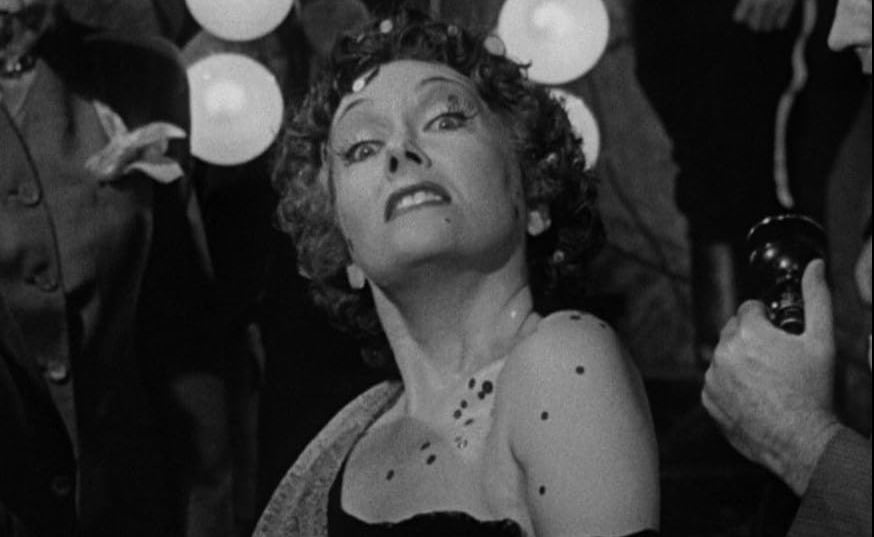
I mistook that tube of plumber’s cement for eye drops.
Rules for Rabbits #6: Give yourself options.
Poor Norma knew this and only this, without this she was nothing, she couldn’t go back to Dayton, she couldn’t go into politics or take up scrimshaw. This was her only option, with that in mind consider that Joe Gillis died richer than she. There would be no Norma after, she was dead too, the spectral Joe Gillis told us as much.
This movie pissed off the Hollywood brass no greater than if Joe McCarthy had invented the television. Louis B. Mayer, one of the founders of the town, railed against Billy Wilder, “You have disgraced the industry that made and fed you! You should be tarred and feathered and run out of Hollywood!”
Wilder’s the man I have ever-growing respect for, because his response to this titan of the movie business was, merely “Go fuck yourself.” And he won the Academy Award for it the next year. In fact, it got twenty nominations, and not just in America: France, Britain, Germany, it won something in Italy—everybody could feel the honesty of this film. It felt like a spontaneous regurgitation of truth, out of nowhere, like the movie business was your sister at Thanksgiving–trying to finally, just once, stop with all the lies. It wasn’t a dream factory. This is why Mayer was so upset.
This is why people keep returning to it. Hollywood makes idols like pagans and smashes them like prophets, no one can answer exactly why, money can’t be it, there’s something in the human soul that gets unleashed that shouldn’t, as if Hollywood by chance discovered a new radioactive ore, the kind that decays your adoration in proportion to your age. Growing old is not sweet, the loss of potency and promise darkens every doorway, the loss of recognition and of those that recognize, are like teeth falling out of the head, eventually your life is corn mush at every meal.
They never made a movie like this again, introspective and critically so, paltry attempts like The Player may have tried, but that was a generation of Hollywood that had no soul. In fact, I consider Sunset Blvd to be a kind of cinematic dividing line, in the A.D./ B.C. sense, because it’s the last time Hollywood assessed itself and it’s past with any kind of clear-headedness.
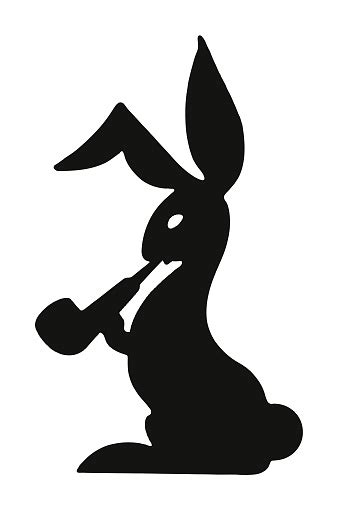
St. Rabbit, patron of prey
Help me keep the fox at bey
Make my footsteps like baby’s breath
That is, until I can fake my death
As for all the other Rules for Rabbits, they’re proprietary, so I shan’t be divulging anymore lest foxes be reading—However! St. Rabbit’s Day is the 11th of May, I expect you all downtown for the parade. In Hollywood, it will be filled with naked gay men dry-humping inflatable penises, but elsewhere it’s a good old-fashioned time with all-sorts Hobo cuisine like baked beans on a tortilla, and raw taco shells and there’s games like” Who’s doin’ the knockin’” and “the car-boot removal contest”. So, bring the kids (except in Hollywood, or basically, anywhere in California) and learn from real-life writers how to back-date rent checks and suture shoes with dental floss. It’ll be a great time!
Leave a Reply